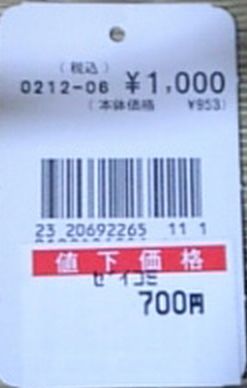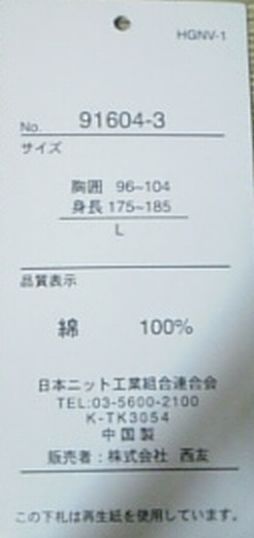Here are yet more sentences from/inspired by buying clothes. Also, here are pictures of the tags. Sorry about the resolution, I know these are about as clear as Loch Ness monster photos. Anyway, we’ll take care of it in a later sentence pack.


Q: (税込) ¥1000
A: ぜい・こみ せん えん
(Tax included) thousend yen
■If you put the price in kanji, then it becomes 1000円 or 千円. Either way, you say it “せん えん”, with the currency last
■千円 = せん えん
■税込(ぜいこみ) can also be written 税込み
■込む(こむ)
Q: 本体 価格 ¥953
A: ほん・たい か・かく きゅう・ひゃく ご・じゅう・さん えん
Actual-item price nine-hundred fifity three yen
i.e. pre-tax price
■九百 五十三 円 = きゅう・ひゃく ご・じゅう・さん えん
Q: 値下 価格 ¥700 ゼイコミ
A: ね・さげ か・かく なな・ひゃく えん 税込み
Reduced-price price seven-hundred yen tax-included
Reduced price seven-hundred yen (tax incl.)
■七百 円=なな・ひゃく えん
■税込み(ぜいこみ) has been katakanized here, however it is most frequently encountered in kanji
■The 税金(ぜい・きん, tax) referred to in these and other examples, and the tax you will most come in contact withm is 消費税(しょう・ひ・ぜい), consumer/consumption tax
■値下(ねさげ) can also be written 値下げ
■下げる(さげる)
Q: サイズ: 胸囲 96→104 センチ
A: さいず: きょう・い きゅう・じゅう・ろく から ひゃく・よん せんち
size: length-around-abdomen 96 – 104 cm
size: chest [for men], bust [for women] 96 – 104 cm
■Although not shown, all the sizes are in units of centimeters, 糎(センチ). The kanji rarely gets used any more. A common abbreviation is ㌢.
Q: 胸囲とは、胸の周りの長さ。
A: きょうい とは(わ) むね の まわり の ながさ
Chest-size [quote/definition] chest [of] around [of] length
Chest-size is the length around the chest
■長い(ながい)
■You can turn an adjective (words that describe nouns: “tall”, “fast”, “stupid” into a noun by taking off the -い at the end and adding -さ…if that explanation doesn’t make sense to you, don’t worry, you’ll pick it up naturally. Anyway, this sentence is an example of a change of adjective 長い(ながい, long) into a noun 長さ(ながさ, longness/length). Other examples: 美味しい(おいしい, delicious)→美味しさ(おいしさ, deliciousness), 煩い(うらさい, annoying)→煩さ(うるささ, annoyingness ;))
Q: サイズ: 身長 175→185 センチ
A: さいず: しん・ちょう ひゃく・なな・じゅう・ご から ひゃく・はち・じゅう・ご せんち
size: height 175 – 185 cm
175 – 185 cm ■For the “height” of animals (as opposed to humans), you might also use the word 体長(たい・ちょう) but I guess most animals don’t wear clothes, so…
Q: 身長とは(人間の)体の高さ。
A: しん・ちょう とは (にん・げん の) からだ の たかさ
Body-height [quote/definition] human [‘s] body [‘s] height
Body-height is the height of (a human’s) body.
■高い(たかい)
Q: 胸囲を測る
A: きょう・い を はかる
Chest/bust length [object] measure
To measure chest/bust length
Q: 人の胸囲を測る
A: ひと の きょう・い を はかる
Person [‘s] chest/bust length [object] measure
To measure a person’s chest/bust length
Q: 動物の体長を測る
A: どう・ぶつ の たい・ちょう を はかる
Animal [‘s] body-length [object] measure
To measure an animal’s height
Q:人間の身長を測る
A: にん・げん の しん・ちょう を はかる
Animal [‘s] body-length [object] measure
To measure a human being’s height

fantastic site, thanks so much (I know what you are going to say: “no applause, throw money”). I wish I had this ten years ago.
One question. My Japanese is pretty good (but crap considering that I’ve lived here so long), but I can’t honestly say that I’ve mastered the Kanji a la heisig. I love your sentence idea, do I really have to finish heisig before starting to memorize the 10,000 sentences? Please say no.
I have been searching for a site that that has japanese movie transcripts. Any ideas?
Do you live in Tokyo? I owe you a beer.
Dan
“no applause, throw money”
HAHA! I love it!
>do I really have to finish heisig before starting to memorize the 10,000 sentences?
….YES!!! Sorry :(…But I bet you can run it like my wife did–just plough through 50 a day.
>I have been searching for a site that that has japanese movie transcripts. Any ideas?
Tell me about it! I want to know, too…I have a friend looking into it. I’ll let everyone know when she gets back to me. I have a feeling that bookstores may be the ticket. Which is sad, because it would be nice to have transcripts online where you could copy and paste them…If the worst comes to the worst I might start doing them myself, but it would take a loooooooooooooooong time…[pause] type [pause] type. I’m guessing 6 hours/movie.
The show タイガー&ドラゴン (Tiger & Dragon) starring 長瀬智也(なが-せ-とも-や) has exact subs..and I mean EXACT. Down to “ああ、まあ、ていうかさ~” and all that good stuff. There are other shows, too. I will post them soon.
>Do you live in Tokyo?
Chiba. I had no idea it was so uncool before I came here. I didn’t know everyone lived in Yokohama.
> Do you live in Tokyo?
> Chiba. I had no idea it was so uncool before I came here. I didn’t know everyone lived in Yokohama.
Yokohama?! To the Chiba folks, Yokohama may seen pretty cool and sophisticated, but it’s not exactly Hiroo or other more upmarket locales, is it?
What a frickin’ 田舎者 !
Which leads me to wonder if, in spite of your utilization of an excellent language learning methodology, your 10,000 sentences consist not so much of standard Japanese as 田舎言葉 …
Okay, sorry, just joking 🙂 Sadly, a bit of tongue-in-cheek abuse is what passes for humour with me. Feel free to abuse me right back!
I used to live in Japan, and while making muuuuch more progress than the vast majority of westerners in learning Japanese (which is not saying much), I didn’t quite get to full fluency. I had all the determination, the effort, but not quite the right method – I didn’t have an SRS program then, and I certainly didn’t appreciate the huge importance of focusing so much on sentences rather than individual words.
But, thanks to your site/antimoon I believe I now have the tools/methodology to get me to ‘full’ fluency.
And I shall be burning my *huge* stock of Japanese language books – what a waste of money almost all of them were.
BTW – I notice that many of your ‘sentences’ shown as samples on this site consist not so much of complete sentences as clauses. Seriously, are clauses just as good as complete sentences for input to the SRS? Or should clauses be the exception, when I can’t find a ‘good’ sentence in my dictionaries?
Hi, amazing site, I discovered it yesterday, and your enthusiasm is really infectious, thanks a million for that;
(I’m learning Chinese and Russian now, and I was looking for a way to keep my Japanese from leaking out…and now that my Chinese is finally getting to intermediate I find it really difficult to read any word in Japanese if I don’t see lots of kana around them…any tips one that?)
Couldn’t help but noticed that in
動物の体長を測る the Answer in hirgana reads どうぶう…instead of どうぶつ !!!
All the best.
@ook
Good eye! Thanks for looking out.
>find it really difficult to read any word in Japanese
I don’t see this as a problem…well, it isn’t for me, personally. I just see it as…a reflex, kind of. Like, today I was walking while doing my sentences, and saw the sign: “無人自動精米所” and I’m all “wu2ren2zi4dong4whaththe–I’m not in CHINA!!”, and realized it was むじんじどうせいまいしょ. I mean, if you have trouble remembering the J-readings, that is a problem. Otherwise, I say, all’s well that reads well.
See this post for more.
/how-to-learn-multiple-languages-without-getting-confused-the-laddering-method
Why bother writing the definitions and the readings in the answer section? You can get all that information and more just by using rikaiChan. In light of having rikaichan to show you the meanings and readings, what is the point of writing anything else in the answer section?
This is what I have in my SRS:
Q:ここ渋谷では違うだろう。ここで見るほとんどの女の子はそれを履いているよ。
A:Not here in Shibuya. Most of the girls I see here are wearing them
All of my entries are like this. The answer section simply has the ‘equivalent’ English sentence and definitions IN JAPANESE for words I don’t know.
This is where I get confused. Does going monolingual equate to not having any English whatsoever in your SRS? For me, this is impossible because rikaichan is (J-E) thus I’m will be seeing some English.
Comment?
Let me expand on my method:
There are a few words in the sentence that I don’t understand. 違う is one of them. So I would go to alc and get example sentences using that word. I pick sentences that are not too difficult, and which show the different usages of the word. The sentences that I pick are based on the ‘translation’ in English.
So I would add these sentences into khatzumemo:
違うと思うけど…(the answer section would have: “I don’t think so”)
違うよ! (the answer section would have: “Wrong!”
Then I repeat this process. To me, this seems to be similar to the method you are using. I have been coming back to this website multiple times in over a year and I’m still not clear on your method.
Ofcourse, I make check the sentences over with my language partner to make sure they are something a native Japanese would say.
Do you see a flaw in my method?
>Does going monolingual equate to not having any English whatsoever in your SRS?
Yes, ultimately.
hi, this is all very interesting but im slightly stuck with the 10,000 sentence method, i have only been studying for just over a year, and what i like to do is write out sentences that are helpful / interesting / difficult etc with the translations into notepads and then i re-read them. is this not essentially the same thing? with your method where do you get those definitions or rather the info you put into the answer section, i only say this because some of them are rather long, i only ask because the guy above mentions something called the ‘alc’ what is this? i use a MAC and with regards to www.mnemosyne-proj.org/ i cant actually open any of the files does anybody know what i could do to resolve this? and finally what is the SRS? thank you and most appreciated. joel
More sentence packs?